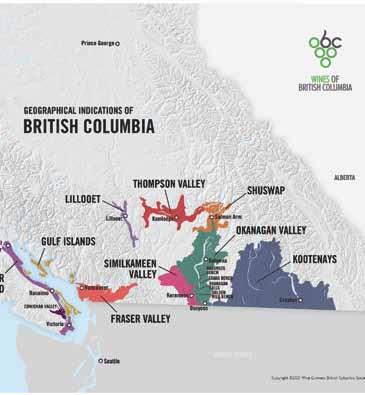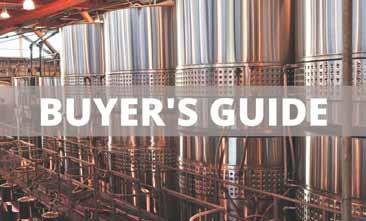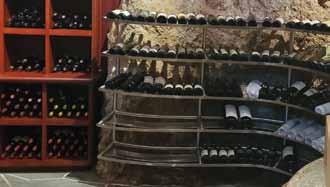
3 minute read
The Word on Wine – Carie Jones
WGBC Launch Topographical Wine Region Maps
Wine lovers, media and trade alike will now be able to get a clear picture of B.C.’s unique sites and growing regions thanks to the release of ten new topographic wine maps highlighting the dramatic landscape of the province and its nine diverse wine regions in detail.
Advertisement
During the last year, Wine Growers British Columbia (WGBC) worked with consulting soil scientist Scott Smith and Linda Decker of Geo Earth Mapping, on the cartographic development of these high-resolution topographic maps. Displaying B.C.’s officially recognized geographical indications (GIs) and sub-geographical indications (sub-GIs) on bottles of B.C. VQA Wine let consumers know the formal place of origin of the fruit and that the wine contains characteristics unique to that region. “The topographic cartography combines simple design incorporating the Wines of British Columbia new brand elements, with the GI and subGI boundaries as regulated by the British Columbia Wine Authority, to construct a detailed look at B.C.’s diverse winegrowing regions,” says Laura Kittmer, Communications Director, Wine Growers British Columbia.
“The maps depict the extent of the GIs which are largely based on watershed boundaries or portions of watersheds. The sub-GI boundaries are based on landforms which are enduring landscape features that do not change over time,” says Scott Smith, Eterrna Consulting, Penticton. British Columbia’s wine regions are on the edge of the wine world, at the highest latitudes where grape growing is possible. Long hours of daylight, baking hot days, cool nights and deliberately moderate yields create intense, bright fruit flavours beautifully balanced against vibrant acidity. From the coast to the vast and rugged interior of the province, British Columbia is gifted with some of the most extreme and unique grape growing conditions on the planet, that are not easily defined. These maps are developed to be used by industry as an essential tool in telling our story. Whether you are in the wine business, interested in learning about wine, or visiting a region, these maps are an important way in understanding B.C. wines and the scope of our diverse terroir. British Columbia continues to build its reputation for excellent winemaking and exceptional wines, further solidifying its place among the best in the world. The release of these maps will help educate the trade, media and consumers about the diverse terroir and unique growing regions that make B.C. such a special place for growing grapes and making wine. To download all new Wines of British Columbia provincial and regional topographic maps, visit WineBC.com.
Orchard & Vine Buyer’s Guide – Find Professional Services and Suppliers
Do you have quality products or services that benefit the orchard, berry, wine, cider or vineyard industry? Your company can be listed online now!
Plus, in the 2022 Buyer’s Guide Print Directory Quality professionals with knowledge, expertise and dedication to this industry. Call 778-754-7078

or email info@orchardandvine.net www.orchardandvine.net

• Aluminum • Stainless steel • Fruit and wine industry • Marine fabrication • General fabrication • Shop and Site work
Unit 2 - 876 Leathead, Kelowna BC
250.470.2658
mike@ironvalleyfabrication.com www.ironvalleyfabrication.com

In May 2021, Wine Growers British Columbia in collaboration with the BC Wine Grape Council, BC Grapegrowers’ Association and the BC Wine Authority, shared the release of the 2019 BC Wine Grape Acreage Report. In support of Wine BC 2030’s strategic pillar, to achieve “Executional Excellence”, the 2019 BC Wine Grape Acreage Report provides new vineyard acreage, and data by region and variety for the entire BC grape and wine industry. The goal of the report (last produced in 2014), was to analyze the vineyard landscape across the province to assess trends in wine grape farming, and to help improve accuracy and timing of industry planning and business forecasting. The 2019 BC Wine Grape Acreage Report was funded by the Ministry of Agriculture, Food and Fisheries and in part by BC Wine Grape Council, BC Grapegrowers’ Association, BC Wine Authority and Wine Growers British Columbia.
Visit WineBC.com to read the full report.





